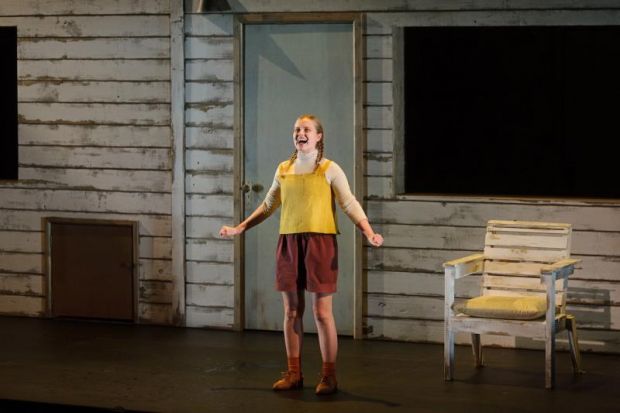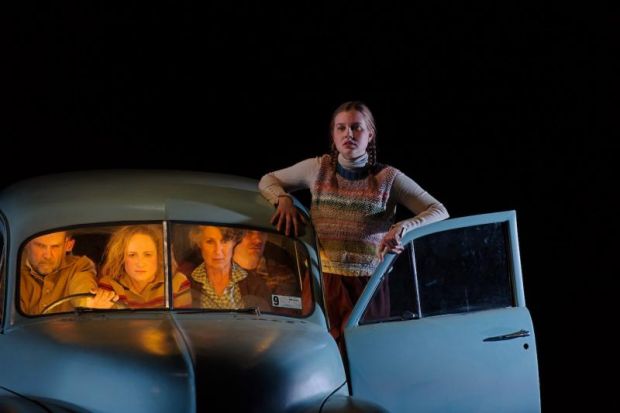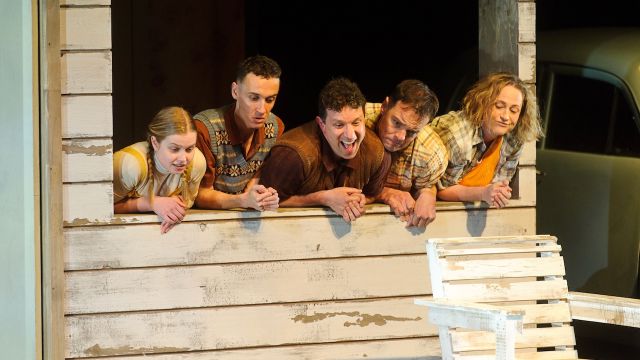My Sister Jill
My Sister Jill is an intimate drama about an ‘ordinary’ working class family across three decades – the 1950s, ‘60s and ‘70s, from the aftermath of WWII to the turmoil of the Vietnam War. What makes this family different is that the father, Jack (Ian Bliss) is a returned soldier, a man who spent three and a half years as a Prisoner of War of the Japanese. It’s an experience that has left him struggling to be a ‘good father’ (and he does struggle), unable to hold on to a job, disturbed, resentful and sometimes violent. Today we’d call his condition PTSD, but in post-war Australia it was ‘get over it, mate’, or get drunk, or be explained and forgiven by, ‘You don’t know what he went through.’
Nor do we know what he really went through while a POW (it’s a given, but we can imagine), or even what sort of man he was before he went to war. But although just about all the action of this play revolves around Jack – and Ian Bliss makes us feel keenly his bewildered, impotent rage – he is not Patricia Cornelius’ subject. He is a recognisable, rounded character (as are all the characters here), but he is a catalyst.

The subject is the effect Jack has on this family – as he clings to worn-out pre-war concepts of how things should be – and are not. Sometimes there are fun and games, but too often it’s standing up to Jack, avoiding him, resisting his efforts to make ‘real men’ out of his three sons, and a ‘nice girl’ out of defiant Jill (Lucy Goleby), the only one with the nerve to defy Dad head on… But then Jill is the hero of My Sister Jill. She’s not the Life Force, but she fights, she thinks, she defies, she is swept up in anti-conscription rallies and marches because she feels and because it feels right.
Eldest son Johnnie (James O’Connell) cops it the worst of course. Mouse (Zachary Pidd) and Door (Benjamin Nichol) are the funny, inseparable twins – until they’re not.
Jack’s youngest, Christine (Angourie Rice) adores him, idolises him, never tiring of hearing and acting out his heroic war stories over and over again – even if we know from the start that most if not all these stories are fictions based on movies and comics – with streaks of truth in the details. But for little favourite Christine, disenchantment will only come with a lot of growing up and an awareness that it is Jack who is driving this family apart.

Wife Martha (the inimitable Maude Davey) acquiesces, excuses and defends, a woman of her time – rather like Linda Loman in Death of a Salesman. It’s not so much that Martha is stuck with Jack; it’s more that she sticks with him. She’s given him five children. And keeping the peace exhausts her. She’s his wife, and she loves him. Even while loving her children. Maude Davey can give us that ambivalence, that contradiction with a glance, a shrug of her shoulder, a placatory smile. A great performance surrounded by great performances.
Marg Howell’s set is us a clapped-out weatherboard house in suburban Melbourne, floral wallpaper and lino inside, a 1953 FX Holden parked beside it. Rachel Burke’s lighting makes the passage of time completely clear, and Kelly Ryall’s subtle sound creates that sometimes eerie suburban silence where there could be another drama going on in the house next door. Floating flats disappear into the flies for a switch to the kids shared bedroom with five beds that diminish in number as the story proceeds (just one when Johnnie comes back from Vietnam), or a bare and lonely space when Christine meets an exuberant Jill in the street.

Patricia Cornelius’ writing is deceptively simple – stripped back, economic, colloquial, unafraid of the occasional – but fitting - cliché. But it is an illusion of naturalism. Her dialogue with its rhythms and its own kind of poetry is suggestive, redolent with a subtext that is always accessible to the audience. Cornelius says she writes for actors and here, in the hands of long-time collaborator director Suzie Dee the characters and their emotions are starkly, painfully clear. This cast finds the subtext and turns it into text. And then, one of Dee’s great abilities – amongst many – is to physicalise the action, to turn emotion into movement.
Younger audience members may not recognise (let alone remember) that there was a Vietnam War, and that conscription for it was by ballot on dates of birth. Even I, who sat glued and tense through those tumbling, lottery-like balls on television that decided who was called up and who not, had to think hard to recognise the sound of this bizarre phenomenon. Well, tough. Someone will explain.

It has taken quite a while for this collaborative duo to make it onto the so-called ‘main stages’ with a Cornelius text. Here they prove yet again that they can hold and enthral an audience, make them invest emotion and care about the struggles of a family whose Dad came back from a war.
Michael Brindley
Photographer: Sarah Walker
Subscribe to our E-Newsletter, buy our latest print edition or find a Performing Arts book at Book Nook.

